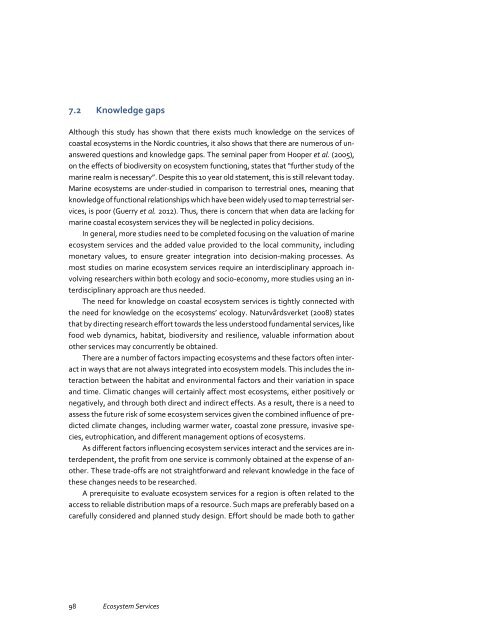Ecosystem Services
FULLTEXT01
FULLTEXT01
Create successful ePaper yourself
Turn your PDF publications into a flip-book with our unique Google optimized e-Paper software.
7.2 Knowledge gaps<br />
Although this study has shown that there exists much knowledge on the services of<br />
coastal ecosystems in the Nordic countries, it also shows that there are numerous of unanswered<br />
questions and knowledge gaps. The seminal paper from Hooper et al. (2005),<br />
on the effects of biodiversity on ecosystem functioning, states that “further study of the<br />
marine realm is necessary”. Despite this 10 year old statement, this is still relevant today.<br />
Marine ecosystems are under-studied in comparison to terrestrial ones, meaning that<br />
knowledge of functional relationships which have been widely used to map terrestrial services,<br />
is poor (Guerry et al. 2012). Thus, there is concern that when data are lacking for<br />
marine coastal ecosystem services they will be neglected in policy decisions.<br />
In general, more studies need to be completed focusing on the valuation of marine<br />
ecosystem services and the added value provided to the local community, including<br />
monetary values, to ensure greater integration into decision-making processes. As<br />
most studies on marine ecosystem services require an interdisciplinary approach involving<br />
researchers within both ecology and socio-economy, more studies using an interdisciplinary<br />
approach are thus needed.<br />
The need for knowledge on coastal ecosystem services is tightly connected with<br />
the need for knowledge on the ecosystems’ ecology. Naturvårdsverket (2008) states<br />
that by directing research effort towards the less understood fundamental services, like<br />
food web dynamics, habitat, biodiversity and resilience, valuable information about<br />
other services may concurrently be obtained.<br />
There are a number of factors impacting ecosystems and these factors often interact<br />
in ways that are not always integrated into ecosystem models. This includes the interaction<br />
between the habitat and environmental factors and their variation in space<br />
and time. Climatic changes will certainly affect most ecosystems, either positively or<br />
negatively, and through both direct and indirect effects. As a result, there is a need to<br />
assess the future risk of some ecosystem services given the combined influence of predicted<br />
climate changes, including warmer water, coastal zone pressure, invasive species,<br />
eutrophication, and different management options of ecosystems.<br />
As different factors influencing ecosystem services interact and the services are interdependent,<br />
the profit from one service is commonly obtained at the expense of another.<br />
These trade-offs are not straightforward and relevant knowledge in the face of<br />
these changes needs to be researched.<br />
A prerequisite to evaluate ecosystem services for a region is often related to the<br />
access to reliable distribution maps of a resource. Such maps are preferably based on a<br />
carefully considered and planned study design. Effort should be made both to gather<br />
98 <strong>Ecosystem</strong> <strong>Services</strong>


